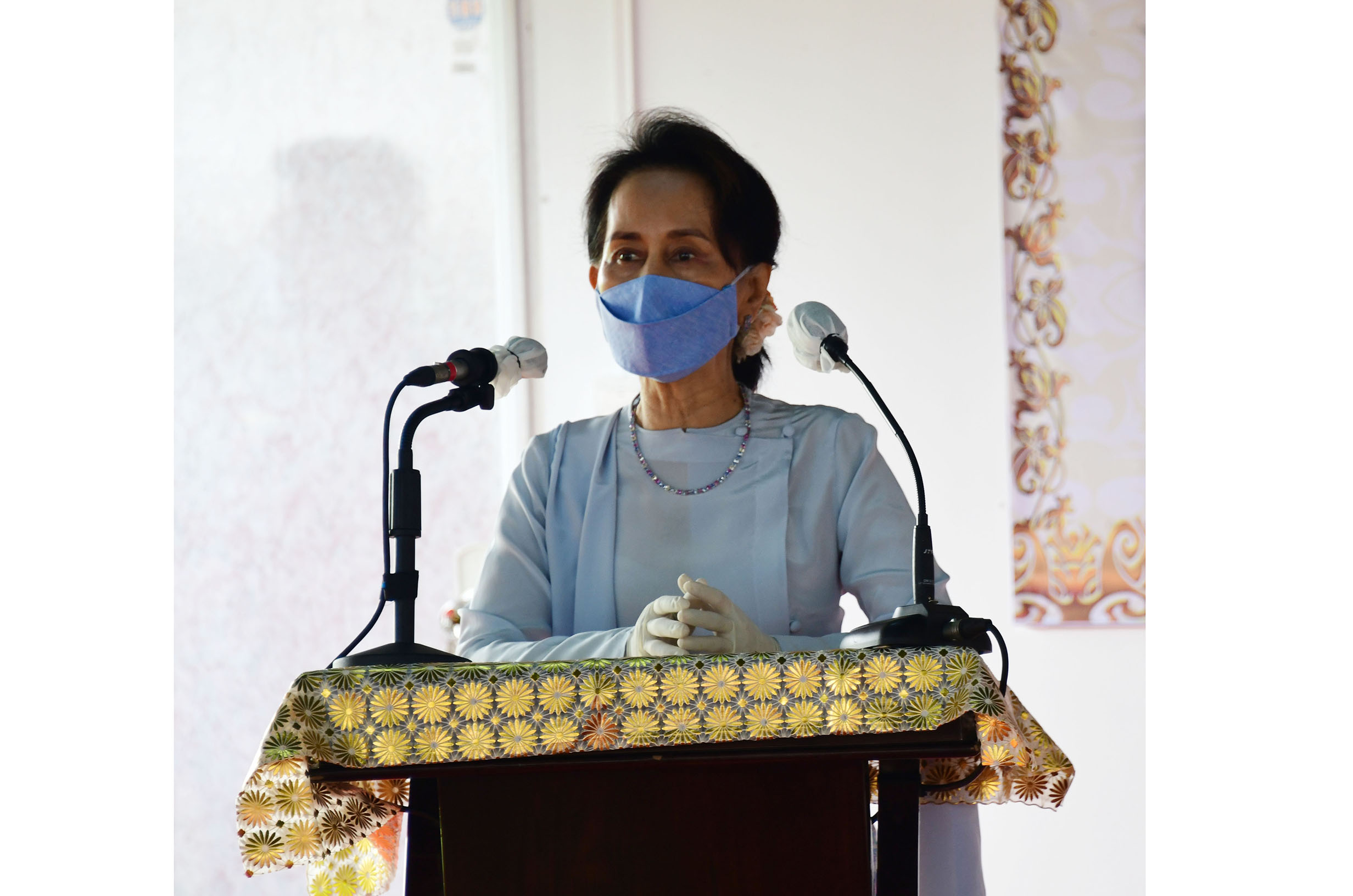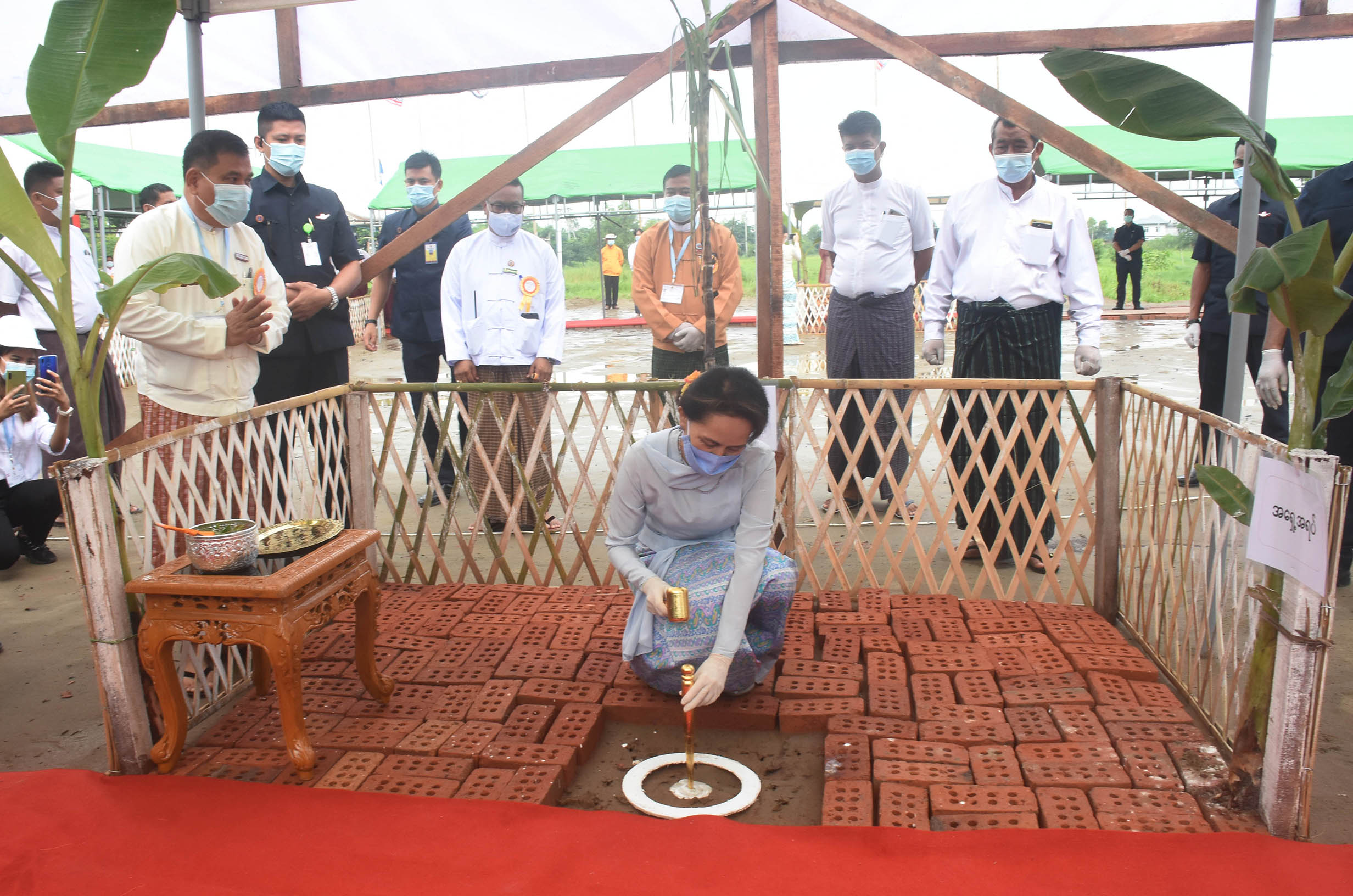August 08, 2020
State Counsellor Daw Aung San Suu Kyi attended the stake-driving ceremony of a public rental housing project in Dagon Myothit (South) Township, Yangon, yesterday.
The housing project is located beside the model special agricultural zone near the intersection of No 7 Highway and the No 2 Junction.
The ceremony was also attended by Union Ministers U Min Thu, U Thant Sin Maung and U Han Zaw, Yangon Region Chief Minister U Phyo Min Thein, Yangon Region Hluttaw Speaker U Tin Maung Tun, ministers of the regional government and officials and the chairpersons of the Myanmar Construction Entrepreneurs Federation, Myanmar Licenced Contractors Association and the Civil and Infrastructural Development Association.
At the ceremony, Union Minister for Construction U Han Zaw remarked that the number of homeless persons is expected to increase as people with monthly income under K300,000, out of 15 million urban population registered in 2014, are losing their jobs and encountered an income decline unaffordable for the rental, and that the government has planned to set up 10,000 units of public rental housing in Yangon, Mandalay and Nay Pyi Taw.
He added that major cities with abundant employment opportunities have commonly encountered an increasing demand for houses and that the development of residential projects could control the houseless population.
The Union Minister continued to say that urban public facilities such as markets, schools, clinics, playgrounds and amusement parks will be set up together with water supply, electricity, roads and other infrastructural structures.
While the private investments are being invited to the rental housing market, the existing project will be implemented with the capitals of the private sector under the private finance initiative system and the government will settle the costs from its extra budgets.
After this, the State Counsellor said “I’m very satisfied that we are able to implement this housing project. The reason is that this is for the livelihood of our people. First of all, to have food to eat is very important. Everyone wants to have enough food to eat. After that we need clothing to wear in accordance with our sense of respect. Next to have housing is just as important as these. We live in a house that we can afford. Everyone wants to live in a secure place in peace with one’s family.
Therefore, in a country such as ours which is still in the process of developing we cannot as yet say that our people have adequate food, clothing and housing. That’s why we have to strive from all angles to have adequate food, clothing and housing. During times like this, the reason why housing projects such as this one are very important is that they provide a solution to the challenges we are facing because of COVID, not only for our fundamental food, clothing and housing needs.
Right from the early stages, when we were formulating programmes to prevent and control COVID, we had to think about the economic impact of this disease. As we thought about how to mitigate the impact of this disease on our economy, we began to realize that it was necessary to encourage housing projects. This is because we found out that in a housing project it is possible to work in accordance with rules and regulations for health issued by the Ministry of Health and Sports.
In a construction project, not only can our people get jobs, but they also have the opportunity to work in a safe place with respect to their health; this is why we encourage construction projects. I am sure all of you present here know that when we began to lift the restrictions for operations to resume, the construction industry was the first. Now when we start the programmes, as soon as we begin the construction project, job creation for the people is very widespread. Even from the very beginning, as soon as we clear the land, our people get jobs. As soon as construction begins, the people who worked on clearing operations would certainly benefit, needless to say. At every stage there are job opportunities; all skilled workers who are involved in the construction process and workers who are not that highly skilled, all of them get job opportunities. Furthermore, we can say that this is good for our long-term development.
If we look at this place now, we can see paddy fields and farmlands. However, after this project has been implemented successfully, it will become a new town. In choosing the site for this project, a lot of thought went into the process. In a construction project, the time for planning is quite limited. We have to think very carefully. As soon as the project starts, job creation is quite rapid. I think that our success will also be quick. That is why we thank all those who have supported and assisted for the success of this project. Those who were involved in the initial planning; in our country, when we begin a project, the acquisition of land is very important. The land must be suitable, and it must not hurt anyone. If this land is owned by any department or private person, we have to settle this matter in accordance with the law in a fair and speedy manner. I think it is known to everyone that as we carry out this process step by step, we have to work with great care and caution to avoid making mistakes.
Another thing, we can say the fact that we can implement a project like this successfully is an indication of the success of cooperation and coordination. Various departments had to cooperate. Entrepreneurs and the government had to cooperate. Then, people also had to cooperate. Workers also had to cooperate. A construction project can really be successful only if everyone cooperated. That is why I want all of you to think deeply when you look at our projects, not only at the superficial level.
I want to say that this project of ours provides benefits not only in mitigating the negative impact of COVID but it is also in line with our long-term development programmes. That is why we take great pride; this is something that is needed very much not only for the present but also for the future; something that needs to happen. I am very grateful indeed. I also encourage this. We have plans to carry out a great deal of such projects continuously.
Just as the Construction Minister has said, not only in Yangon, we plan to implement many of such projects also in Nay Pyi Taw. At the moment, we can say that it has been eight months since we have been facing the COVID disease. Why, in actual fact, it began in the first month of this year. Since it has been eight months, we are suffering from the impact not only all over our country but all over the world. Up to this time, we can say that our country can be hurt by the economic impact as well as in matters of health. However, we cannot say that this COVID problem is over. I don’t want to take pride and say that up to now we were able to control this disease. I am afraid that the situation might change. However, I can see that up to now, our work has been satisfactory. But as it is now eight months, the negative impact on the economy will become more apparent. That’s why I wish to say that implementing such projects at this time is very timely and in sync. I believe that there will significant benefits and significant-good results because of the timeliness.

In conclusion, I wish to thank all those who have participated and cooperated as well as the departments. I also see this ground-breaking ceremony as having full of meaning and that this act signifies the laying of a firm foundation for the future, for the interest of our people.”
Chairperson of Myanmar Construction Entrepreneurs Federation U Shein Win explained possible employment opportunities from this project and suggested the requirement of laws pertaining to rental housing to address difficulties of people while the public housing sector is developing.
The State Counsellor set a stake in the specific place of the housing project and sprinkled scented water over it.
The Union Ministers and officials drove the stakes into the ground on the respective places.
The public rental housing project will have 5,072 units of flat on 171 acres of land with the supervision of the Ministry of Construction and support of Yangon regional government. It will be jointly implemented by the Myanmar Construction Entrepreneurs Federation, the Myanmar Licenced Contractors Association and the Civil and Infrastructural Development Association. The associations will construct 6,300 flats in Yangon Region and over 1,200 flats in other areas, in addition to 700 flats in Nay Pyi Taw and 3,000 flats in Mandalay Region.
Myanmar introduced public rental housing project in 1951 with very lower cost compared with the market rate for people such as civil service staff and common families.
The records of the Ministry of Construction have shown that over 9,000 flats in parliamentary democracy period, over 11,000 under the socialist government and over 14,000 at the time of democratic government were constructed. However, the demand for rental flats remains high in Myanmar. —MNA
(Translated by Kyaw Myaing, Aung Khin)



